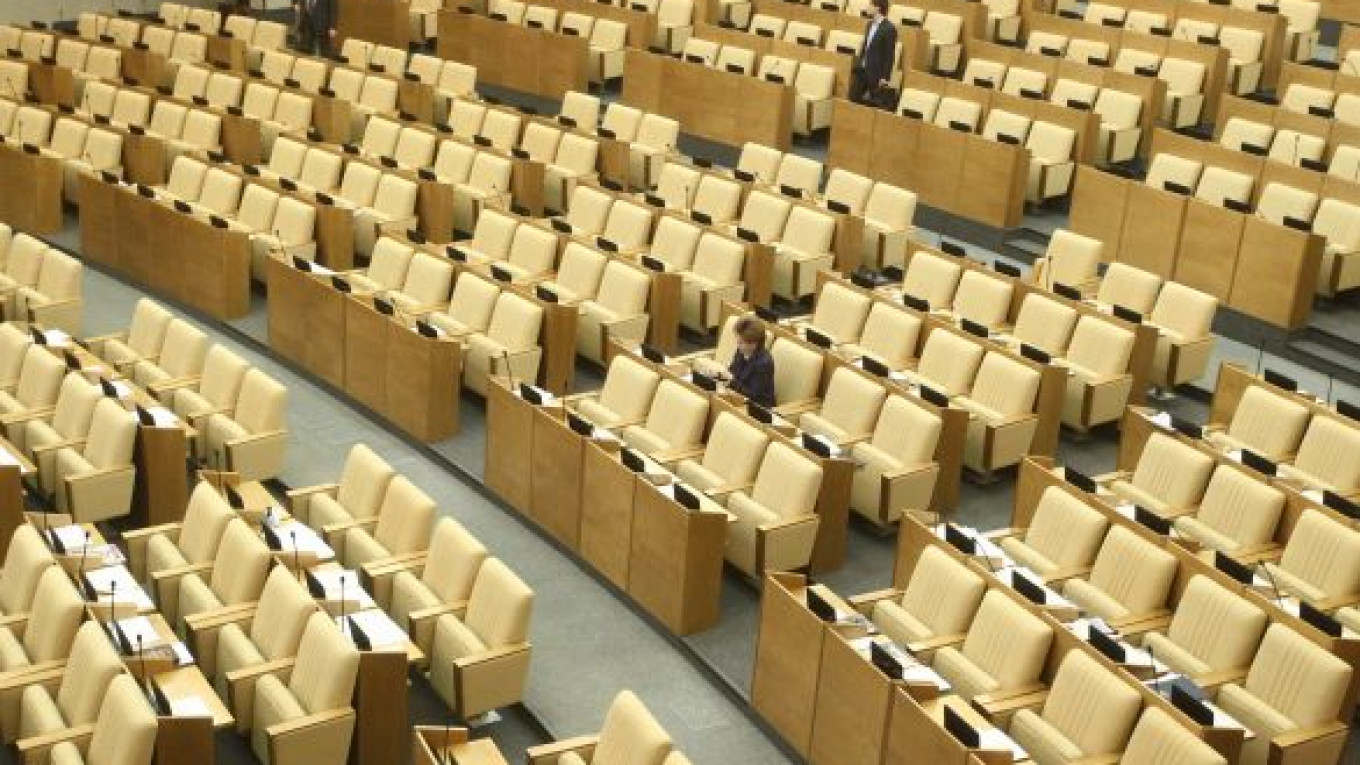In a widely expected response to the passage of the U.S. Magnitsky Act, State Duma deputies on Monday introduced a that would make Americans suspected of mistreating Russians personae non gratae.
The bill bans Americans from traveling or investing in Russia if they are deemed to have "illegally" harmed Russians, according to a draft available on the Duma's website.
The legislation mirrors but does not match its American counterpart, which imposes similar restrictions on Russians suspected of human rights abuses without specifying the nationality of the victim.
Analysts have said the Russian bill is mostly symbolic, and senior lawmakers on Monday seemed to focus on denouncing the Magnitsky Act rather than arguing the merits of their response.
"It's astonishing that a country that has created secret prisons abroad — places of lawlessness and arbitrary justice, where inmates are subjected to torture, like in the Middle Ages — would lecture another country on moral issues," Duma Speaker Sergei , according to a transcript on the Duma website.
The bill appears to take special aim at U.S. officials involved in the arrest and prosecution of arms dealer Viktor Bout, who was extradited from Thailand to the United States over Russian objections in 2010.
These include provisions targeting Americans involved in "kidnapping and unlawful imprisonment," "groundless prosecution" and "groundless and unjust punishment."
The bill also freezes the Russian assets of anybody on the list and bans any property or investments.
Hermitage Capital co-founder William Browder, who has spearheaded the effort to pass "Magnitsky acts" throughout Western Europe and North America, dismissed the Russian bill as wrongheaded.
"They should be focusing on punishing the people who have abused human rights in Russia before making symbolic retaliation like this," he said. "Secondly, it's hard to imagine any American officials feeling all that hard done by not being able to travel to Russia or hold money in Sberbank."
Political analyst Pavel Salin said Russia's retaliation, which is widely believed to include a new barrier on imports of U.S. meat, is "weak" and shows that Russia has few tools at its disposal.
Russia's only serious lever against the United States is the Northern Distribution Network, a NATO supply route to Afghanistan that runs through Russia, Salin said, adding that Moscow hasn't yet shown any intention of using this as a bargaining chip, for fear of a backlash.
A proposed EU-wide Magnitsky list would be more painful to Russia, which is the bloc's third-largest trading partner but only the 37th-largest for the United States.
But while Browder said the prospects for bills everywhere "increased exponentially" as a result of the American bill, Salin and other analysts have said an EU or British bill is unlikely.
The Russian bill, which was submitted by the leaders of the four Duma factions, looks unlikely to face any serious opposition in the 450-seat chamber, which is controlled by United Russia.
Only about seven members of the moderate A Just Russia party spoke out against the measure at a faction meeting, said Deputy Ilya Ponomaryov, adding that opposition in other parties was unlikely.
Ponomaryov said he was "strongly against" the language of the bill, which he said should target nationals from any country — not just Americans — who abuse Russians.
The bill is set to undergo its first reading Friday and be passed by the end of the year, Naryshkin said. It calls for sanctions to go into effect on Jan. 1.
The Magnitsky Act is named after Hermitage Capital lawyer Sergei Magnitsky, who died in pretrial detention in 2009 after being arrested on suspicion of fraud. His supporters say the charges were fabricated because Magnitsky had investigated a $230 million tax fraud scheme.
President Barack Obama has said he will sign the bill, which also establishes permanent normal trade relations with Russia, and the White House will likely release a list of banned persons in the next two to three months, Browder said.
Also, in a Twitter message Monday, U.S. Ambassador Michael McFaul criticized a restriction on imports of meat produced with the feed additive ractopamine, which is already banned in China and the European Union, as a "very unfortunate development."
Russia's Federal Veterinary and Phytosanitary Inspection Service has denied that the new rule, announced Friday, is connected to the Magnitsky Act, which the U.S. Senate approved the day before.
Meanwhile, a Moscow court received criminal documents in a case of tax evasion against Browder and Magnitsky. A judge has been assigned to the trial, and the date of the first hearing will be determined soon, a Tverskoi District Court spokeswoman said Monday, Interfax reported.
Related articles:
A Message from The Moscow Times:
Dear readers,
We are facing unprecedented challenges. Russia's Prosecutor General's Office has designated The Moscow Times as an "undesirable" organization, criminalizing our work and putting our staff at risk of prosecution. This follows our earlier unjust labeling as a "foreign agent."
These actions are direct attempts to silence independent journalism in Russia. The authorities claim our work "discredits the decisions of the Russian leadership." We see things differently: we strive to provide accurate, unbiased reporting on Russia.
We, the journalists of The Moscow Times, refuse to be silenced. But to continue our work, we need your help.
Your support, no matter how small, makes a world of difference. If you can, please support us monthly starting from just $2. It's quick to set up, and every contribution makes a significant impact.
By supporting The Moscow Times, you're defending open, independent journalism in the face of repression. Thank you for standing with us.
Remind me later.


